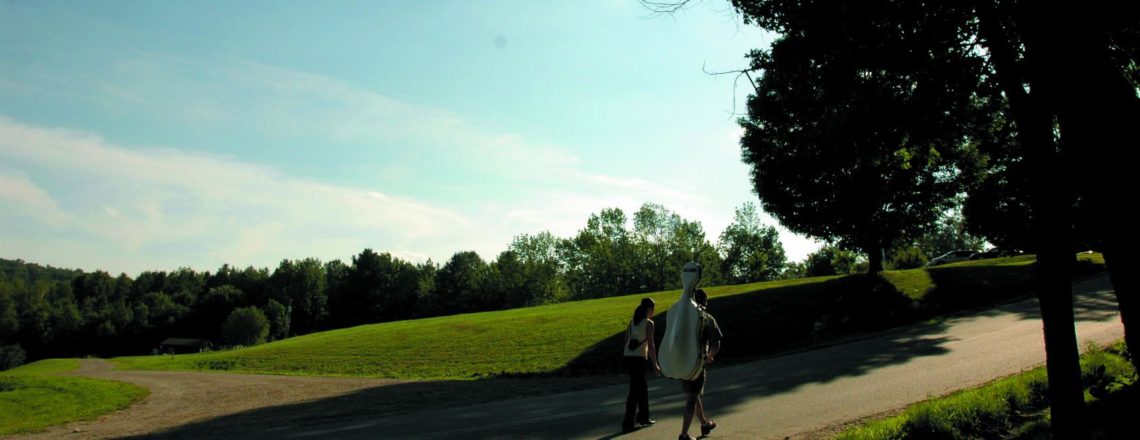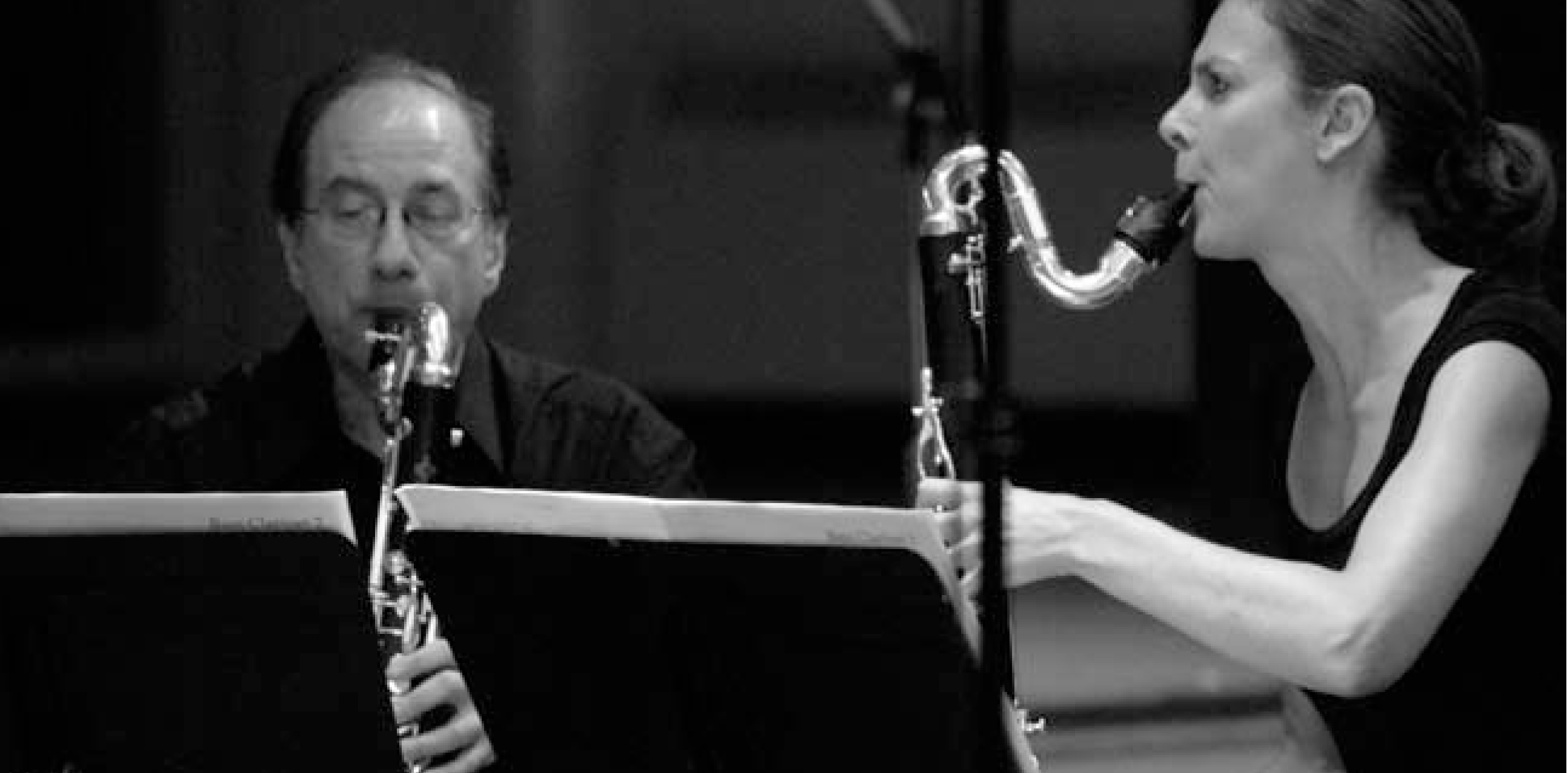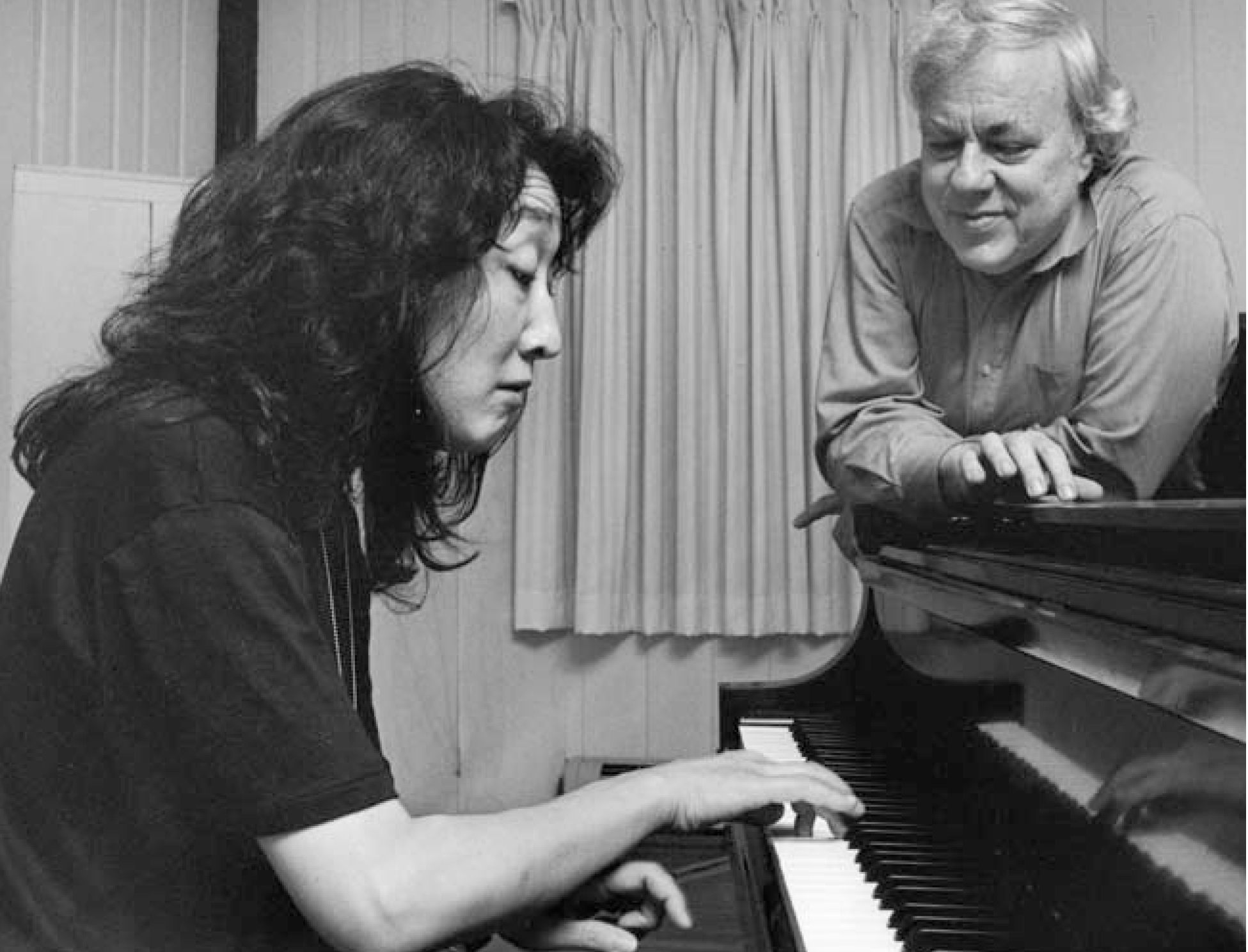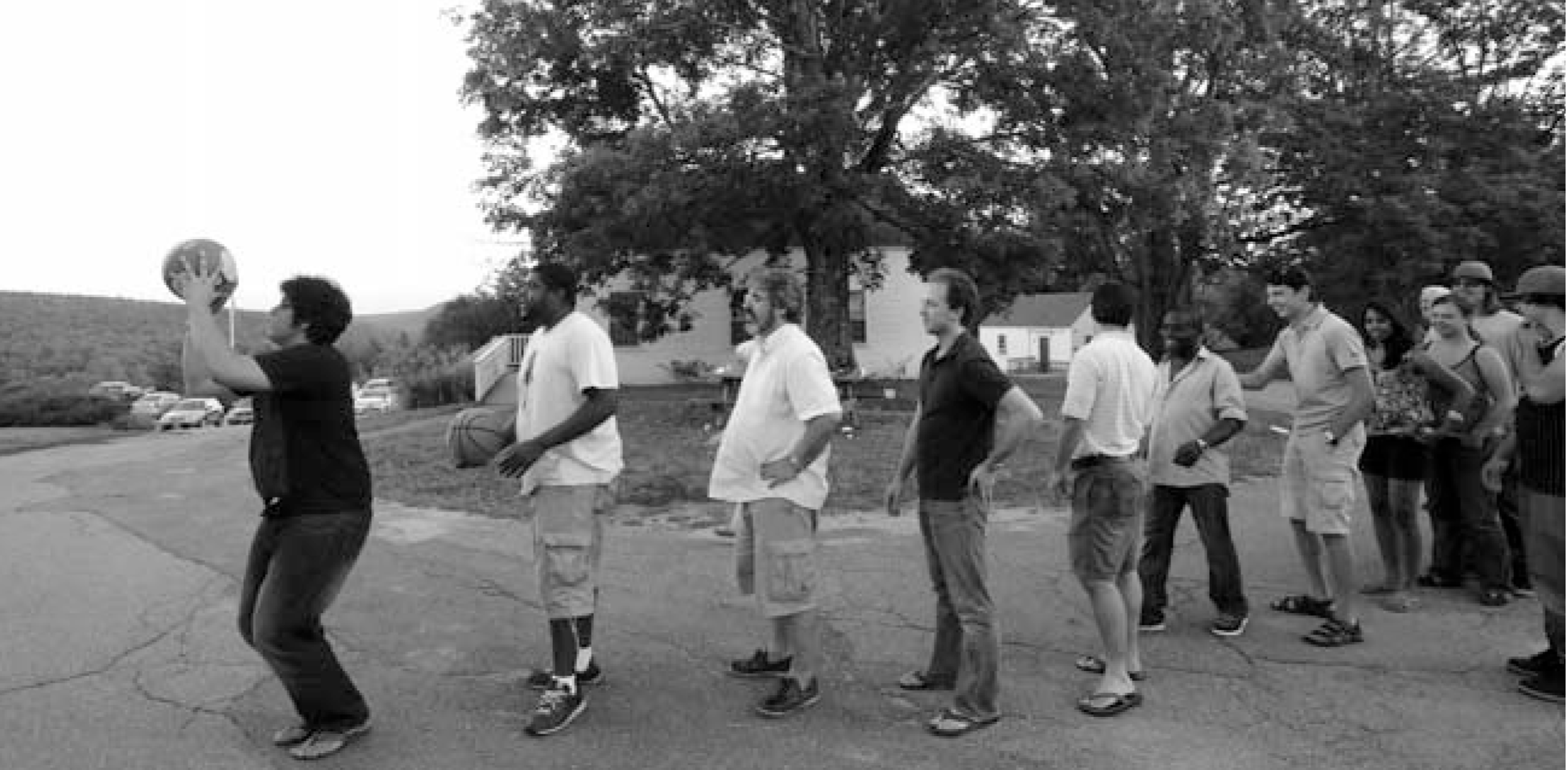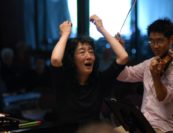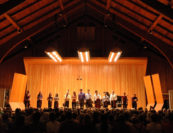A seven-hour flight from London Heathrow to Boston followed by a two-and-three-quarter-hour drive may not be the ideal way to approach Marlboro. Something more meditative, involving a horse and cart, and a detour to Walden Pond, would be more appropriate. But you certainly feel the contrast, and as you climb steadily, up wooded shoulders of the folded ranges which imperceptibly become the Green Mountains, get a sense of how remote the place is.
Somehow Marlboro seems remote not just geographically but also temporally. On arrival in the village the sense of time is confused by a group of clapboard buildings from the late 18th century; the Whetstone Inn, where I’m staying, is dated 1786, and, in the best possible way, has kept itself remarkably free of what are called “modern conveniences.” The Marlboro Historical Society, which meets once a week in summer, sounds improbably high-minded for these latter times.
Sense of time, sense of place and scale are intimately linked. Everything at Marlboro is modest, not grand or showy, and that modesty, I sense, is an inward, spiritual quality as much as a physical one – to do with, say, the “womb-like” nature of the surrounding landscape (Frank Salomon’s words) or the tiny size of Marlboro College, the quirky liberal arts institution which has hosted Marlboro Music for over sixty years and which is said to be the smallest university in the United States.
But theorising only takes you so far. If I am going to understand more about this place I am going to have to take the plunge. That means listen, to some of the many rehearsals that are going on every day, in spaces across the campus, all marked up on the famous schedule board outside the dining hall.
If you’re going to take the plunge, you might as well dive in at the deep end. The first rehearsal I attend is of Elliott Carter’s Mosaic, a glittering, intense 10-minute work from 2004 for harp, violin, viola, cello, double-bass, flute, oboe and clarinet. The clarinettist is the slight, gangly figure of Charles Neidich, a friend and associate of Carter’s for many years, and it is obvious that he will be primus inter pares, guiding the group which otherwise consists of young musicians in the sometimes fearsome rhythmic complexities of this piece. But my main impression is not of an arid process of problem-solving, but of a profoundly enjoyable exploration. There are gusts of laughter, and exclamations of delight: “it’s great”, “such a choreography”, “it should be fun, it should be very cute.”
When Neidich takes up the bass clarinet, I’m reminded of the Pink Panther saxophone theme from the Clouseau films. The cellist, the extravert, big-hearted young Icelandic-American Saeunn Thorsteinsdottir, complains good-humouredly that her colleagues are not following her at one point: “people are not necessarily paying attention to your downbeat,” says Neidich, with an attempt at donnish diplomacy, and everyone dissolves in giggles.
Mosaic turns out to one of the guiding threads of my week at Marlboro, which starts with one of the many rehearsals of the piece and ends with the triumphant performance at the Sunday concert. It gives me something to hold on to, something to lead me through the labyrinth (I am not sure who the Minotaur would be in this case). I get to know some of the musicians, and am privileged to hear Neidich speak at length about Carter, and illuminate this contemporary master in a way no-one else has managed for me. Carter comes alive as drama, the instruments as different dramatic personae on a stage, each distinct in voice, interacting with each other, arguing, sometimes ignoring each other, just occasionally coming together in radiant beauty.
Not a bad image of Marlboro itself.
Serious fun could one of Marlboro’s mottoes. After the Carter rehearsal I join everyone for lunch in the dining-hall, which reminds me not so much of my own college days as of even earlier times at two English boarding schools. Not that we would have been allowed to indulge in the solemnly childish ritual of napkin ball-throwing, which I try to study in anthropological fashion, looking for hidden codes and meanings. Eventually, I decide there are none: this is a probably just a way of releasing the tensions which are bound to build when a bunch of high-spirited, hand-picked people ask so much of themselves and each other; and after a few days I join in myself, with spectacularly unsuccessful results.
After supper on day two, I join a group, consisting of the flautist Joshua Smith, the cellist Saeunn Thorsteinsdottir and the harpist Sivan Magen, who decide to play through the three flute trios Haydn wrote for the London publisher John Bland in 1789-1790. I had not even known of the existence of these exquisite works, with their own unique flavour and wit. There is no ulterior motive behind this playing; simply exploration of lesser-known repertoire by a great master. This is not leading anywhere, certainly not to a public performance; after all the person playing the piano is not a pianist. But I have the feeling that I am privileged to be part of something that is both entirely unpretentious and absolutely vital; the essence of music-making as shared enjoyment.
Later that evening, as I walk through the darkling campus towards the coffee shop, I am stopped in my tracks by more familiar music: it is the slow movement of Schubert’s C Major Quintet, and as I peer into the dining-hall I see that the burly first cellist, and unmistakably the guiding force, is Peter Wiley. The group, with the exceptional, selfless violinist David McCarroll taking the first violin part, is playing, to no audience, with fierce commitment and emotional intensity. I am reminded of the performance through which I got to know this work, from my father’s collection of LPs, with Pablo Casals, Isaac Stern, Alexander Schneider, Milton Katims and Paul Tortelier, not recorded at Marlboro but featuring three great Marlboro musicians. Nothing I hear all week will move me more, or more completely sum up the spirit of the place, its continuity, the passing of values between generations.
To give a more explicit formulation of all this, there is no-one better qualified than the eminent pianist and former Co-Artistic Director Richard Goode. We talk one warm, muggy afternoon sitting on a grass bank under maple trees close to the Persons Auditorium. Goode came to Marlboro first when he was 14, in 1957, when the Festival itself was still quite young. He studied with Rudolf Serkin later and gained from him his essential Austro-German upbringing. “I felt the intensity of his musical concentration, the faithfulness to the score, the attention to detail. Serkin was both extremely correct and an intense and great performer under fire.”
Speaking to Goode, a brilliant, self-effacing man with a professorial air, you get a strong feeling of a very particular inheritance having been received and being passed on with the utmost care, but without preciousness. “Marlboro has been a very large fraction of my musical education – my first real immersion in chamber music, my introduction to chamber music as a way of life.”
But part of the Marlboro inheritance consists in the fact that Goode does not “essentially feel different playing solo and chamber music.” As it happened, after his immersion in chamber music, Goode’s solo career blossomed – “Serkin said to me ‘You’re basically a soloist’” – and he has found himself playing little chamber music, except at Marlboro, over the last twenty years.
This seems a good example of the Marlboro philosophy, positing a basic equality not just between individuals but between kinds of music. The whole Marlboro experience could be defined as a set of variations on Jacques Barzun’s deceptively simple statement that “all communication implies equality.” The smallest, slightest piece will receive just as much attention here as the Schubert quintet. All the music – and the selection of repertoire is not imposed from above but brought by the performers – will be explored in depth and rehearsed in detail. “I later learned,” Goode explains, “that Serkin gleaned much of this from Schoenberg and his Society for Musical Performances. There were between fifty and a hundred rehearsals for the performances of Mahler symphonies for four hands.”
That might sound excessive, and the perfectionism at Marlboro is certainly uncommon. Some pieces, Goode goes on, are not felt to be ready even after twenty or so rehearsals. They can wait another year, and I will soon hear a fine example of this unhurried approach to rehearsal in a thrilling performance of Ligeti’s fierce and fiercely demanding Horn Trio.
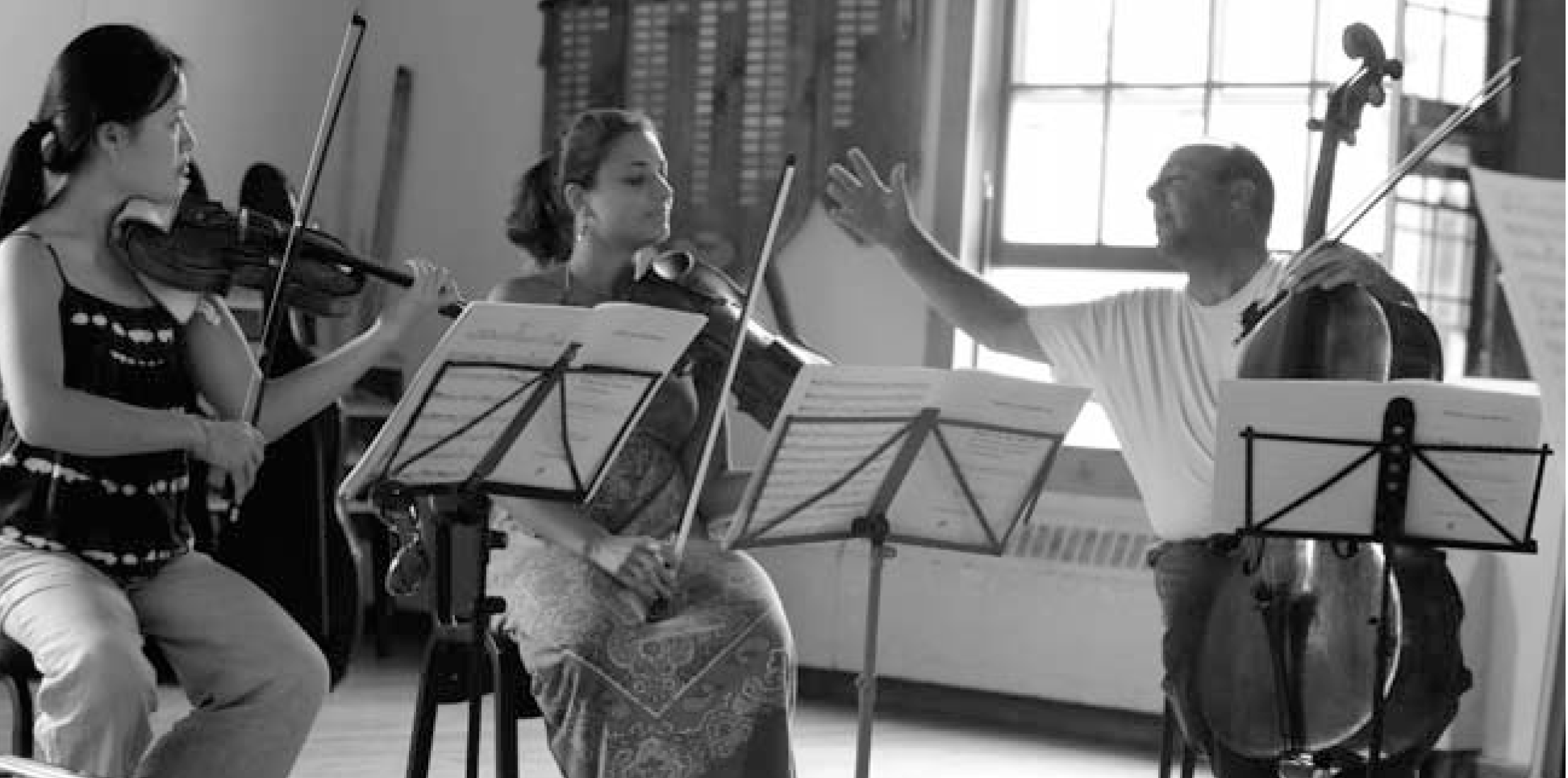
Tien-Hsin Cindy Wu, Milena Pajaro van de Stadt and Peter Wiley rehearsing the Beethoven Septet. Photo by Clemens Kalischer.
The central continuity at Marlboro is the principle of having senior musicians guiding younger ones, in each group: this, in fact, is the tangible way in which the tradition is passed on. The principle is firm but also quite flexible. “Some groups don’t need a senior; the senior can listen and not play, as Moyse did”. But my impression over the whole week, listening to the way musicians such as Wiley in the Beethoven Septet, Neidich in Carter’s Mosaic and Mitsuko Uchida in Brahms’s C Minor Piano Quartet transmit their wisdom and experience to younger colleagues, is that nothing at Marlboro matters more than this. Uchida by osmosis as much as words communicates her unique sensitivity to colour and minute gradations of dynamics to her receptive trio of string players.
Artistic Director Uchida has an electric and effervescent presence. She also has “her feelers” out, as she puts it; everyone at Marlboro knows she will be there for her special breakfast in the coffee shop at 9.30, and she will be there again in the evening when people unwind and open out. Her speciality is not just musical dynamics but the more unstable and treacherous area of group dynamics.
Uchida worries, as we talk one evening over Japanese tea-bowls of Macallan malt whisky, not just about how extra-musical relationships can affect musical ones, but also about the world outside Marlboro and how “the changing times” are impacting on the ideal musical republic founded by Busch, Serkin and Moyse. Changing times mean, in part, changing economics and the sheer difficulty of making chamber music into a viable way of life. “A string quartet means five plane tickets for the players and the cello, and small halls with small audiences; how do the economics add up?” Such questions, linked to the survival of the apparently anachronistic but uniquely valuable republic of Marlboro, can keep her awake at night.
Marlboro may be at a crossroads, Uchida says, but it has always been at a crossroads. There was never a master plan, and things have constantly evolved. What remains, and what I get the impression Uchida will defend with her life, is the great Austro-German tradition personified by Serkin’s intense seriousness, perfectionism and dedication to the music.
This is all making the place sound exceptionally earnest, which it is not. As I write I am recalling not just the napkin ball-throwing, but swims down at the South Pond and frisbee and basketball sessions late into the evening on the lawn in front of the dining hall. But maybe just because Marlboro encompasses not just music but a whole communal way of living extending over seven weeks of a New England summer, it has such a profound effect on people.
Musicians for decades now – you can think of such distinguished names as Murray Perahia, Yo-Yo Ma, András Schiff, Joshua Bell, Samuel Rhodes, Nobuko Imai, Radovan Vlatkovic – have been insisting that Marlboro is not just musically inspiring but life-changing. Anthony McGill, principal clarinettist of the New York Philharmonic, joins the chorus: “Marlboro changed my life completely – gave me the imagination of what my life could be. And it was realised right here, playing with musicians like Mitsuko.” McGill has returned to Marlboro as a mature musician now, in his thirties.
Others, such as the mezzo Jazimina MacNeil, are at an earlier stage, embarking on post-graduate study: she put it to me, with a disarming openness and sincerity, that Marlboro has “contributed to my burgeoning understanding of what being a human being is about, which feeds into my singing.” For her Marlboro, all that is good about the place, “grows out of a great pool of love, for music.”
Time plays strange games at Marlboro. As Uchida has said, there is the great luxury of having an almost infinite amount of time, but that time can pass both very slowly and very fast. Certainly for me the end of my week looms up just as I am beginning to feel acclimatised to the place. But it can be celebrated in the public performances of pieces I have followed in rehearsal, including Carter’s Mosaic but also the two Brahms piano quartets and the Beethoven Septet. This last, with Peter Wiley inspiring everyone from the cello, eyes darting in all directions, Sarah Beaty unforgettably alive, limpid and tender in the clarinet part, Tien-Hsin Cindy Wu rising undaunted to the virtuoso demands of the violin part, Benjamin Jaber gloriously deadpan on horn, seems to me a prime embodiment of Marlboro at its best. A piece often slightly looked down on, as “light” Beethoven, has been mined and explored with infinite care, brought to life in every detail, performed in the end with infectious joy.
The work that is done at Marlboro does not end at Marlboro. I am reminded of something Peter Wiley has said during a rehearsal: “keep it here amongst us and it will be good out there.” He meant out in the auditorium, but the implications go further. For decades now the music-making of Marlboro has been taken out into the wider world, specifically in the form of the Musicians from Marlboro programme and more generally in the worldwide diaspora of musicians who have found in this remote and peaceful neck of the woods an essential point of reconnection to music, to certain values and essences that go even beyond music, and to themselves. At the end of my week I feel that it may be of surpassing importance in a scattered, distracted world that the little republic is kept “here amongst us”.

